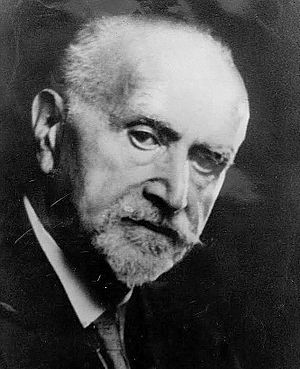Lucien Lévy-Bruhl facts for kids
Quick facts for kids
Lucien Lévy-Bruhl
|
|
|---|---|

Lucien Lévy-Bruhl
|
|
| Born | 10 April 1857 Paris, France
|
| Died | 13 March 1939 (aged 81) Paris, France
|
| Nationality | French |
| Alma mater | École normale supérieure |
| Scientific career | |
| Fields | philosophy, sociology, ethnology |
| Doctoral students | Alice Voinescu |
| Influences | Émile Durkheim |
| Influenced | Paul Masson-Oursel, Carl Jung, Louis Hjelmslev, Hélène Metzger, Léon Brunschvicg, Emmanuel Levinas, Jean Piaget |
Lucien Lévy-Bruhl (born April 10, 1857 – died March 13, 1939) was a French thinker. He studied philosophy, which is about big ideas and how we think. He also helped start the fields of sociology (the study of human societies) and ethnology (the study of different cultures).
Lévy-Bruhl was very interested in how people think. He was born in Paris, France.
Contents
Ideas About Thinking
In his book How Natives Think (published in 1910), Lévy-Bruhl suggested that there are two main ways humans think. He called these the "primitive" mind and the "modern" mind.
The Primitive Mind
Lévy-Bruhl believed the primitive mind did not separate the real world from the supernatural. This means it saw magic and spirits as part of everyday life. He said this mind used "mystical participation." This is a way of thinking where people feel a deep connection to things around them, like animals or objects. They might believe they can influence the world through this connection. He also thought this way of thinking did not worry about things that seemed to contradict each other.
The Modern Mind
In contrast, Lévy-Bruhl described the modern mind as using careful thought and logic. This way of thinking tries to understand things based on facts and reasons. It also looks for contradictions and tries to solve them.
Later Thoughts and Influence
At first, some people thought Lévy-Bruhl believed that human minds simply evolved from "primitive" to "modern." However, his later writings showed a more complex view. In his Notebooks on Primitive Mentality, he admitted that even people in modern societies use non-logical ways of thinking. For example, he pointed out how people might act illogically when gambling.
Lévy-Bruhl's ideas were important for other thinkers. His concepts, like "collective representation" (shared ideas in a group) and "participation mystique" (the deep, mystical connection mentioned earlier), influenced Carl Jung. Jung was a famous psychologist who studied the human mind. Lévy-Bruhl's work also played a role in the ideas of Norman O. Brown, another important thinker.
Key Works
Lucien Lévy-Bruhl wrote many books about his ideas:
- History of Modern Philosophy in France (1899)
- How Natives Think (1910)
- Primitive Mentality (1922)
- The "Soul" of the Primitive (1927)
- Primitives and the Supernatural (1931)
- Primitive Mythology (1935)
- The Mystic Experience and Primitive Symbolism (1938)
- Notebooks of Lucien Lévy-Bruhl (published after he died in 1949)
See also
 In Spanish: Lucien Lévy-Bruhl para niños
In Spanish: Lucien Lévy-Bruhl para niños
 | Roy Wilkins |
 | John Lewis |
 | Linda Carol Brown |

